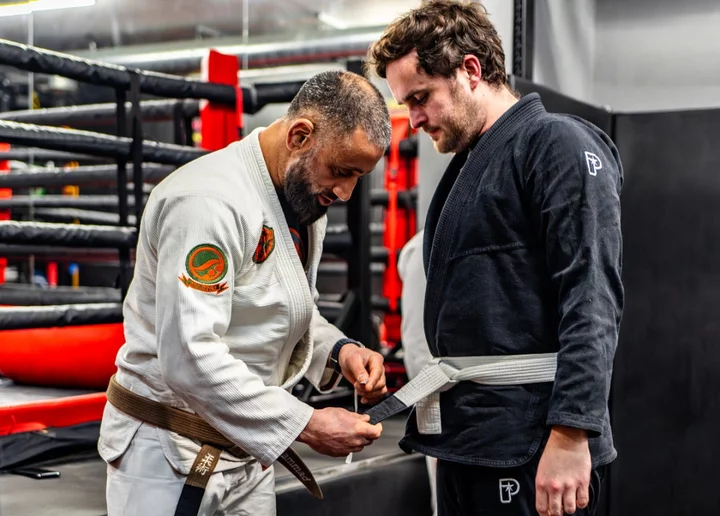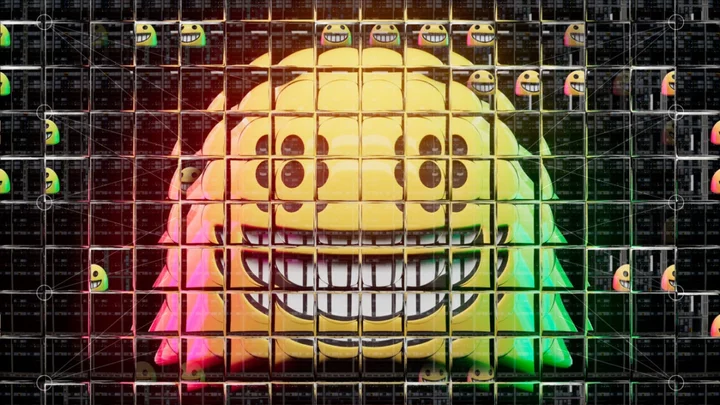
Voices: I’m a tech nerd who does jiu-jitsu. I know exactly why Mark Zuckerberg wants to fight Elon Musk
Mark Zuckerberg and I have very little in common. My bank account is much smaller, and nobody would ever be tempted to make a film about my life. But we do share two very important things: we're both tech nerds, and we like putting on pyjamas and having people pretend to kill us. Like Mark Zuckerberg – and now Elon Musk, who he is planning to fight in what would be the world's biggest MMA match – I am a relatively recent convert to Brazilian jiu-jitsu. And like Mark Zuckerberg, I have found that it has improved my whole life, and changed who I am. My own journey with BJJ began in typically nerdy fashion: my partner described it as "human chess", which was enough to make me intrigued. I joined a local gym, 313 Fitness, in London's Manor Park, about a year ago. Initially, I was confused by the complexities of the sport – the "gi" kimono that you wear, the complex positions you're required to get into, the various kinds of rolls and handstands that you do to warm up – but they quickly became both everyday and absolutely thrilling. This is the game of jiu-jitsu: the winner is the person who makes the other submit, by placing them in a position that would lead to their joints being broken or putting them to sleep. This might sound grisly. In some ways it is. But in that violence can be found some of the most important lessons I have learnt in my life – it is an experience that teaches you invaluable lessons about the world, other people, and yourself. The thing that first becomes clear about jiu-jitsu is that you cannot be thinking about anything else. There is no time for anxious overthinking when someone is sat on top of you, trying to break your arm. If you let your attention drift, your opponent will use it to their advantage; losing focus for a moment can mean losing your fight. It's probably obvious how this applies to the rest of your life. But even in the moment there is a brutal thrill in training your focus in this way, and facing painful consequences if you don't. It is a particularly unsparing kind of mindfulness, which teaches you just how valuable your own attention span is. The raw demand on your attention is just one of the very primal parts of the sport. There is a harsh simplicity in the rules of jiu-jitsu: your opponent wants to submit you, and you want to submit them. But at the same time, it employs its own very specific and particular logic. It is a game of leverage, of positioning, and of anticipating the movements of a person who is right on top of you. As with chess, the best players are not thinking about the thing in front of them, but the thing that is coming a few moves down the track. And just like with chess, the winner is the person who can exploit their own strengths, even if they are in a weaker position. This pitiless logic is perhaps the reason that BJJ has proven so appealing to poindexters: Zuckerberg and Musk are far from alone in the sport, and one of its leading lights is Mikey Musemeci, an athlete who calls himself "Darth Rigatoni" and has happily referred to himself as a nerd. Jiu-jitsu might punish overthinking, but it is a profoundly thoughtful martial art. It is a humbling one, too; jiu-jitsu is actively destructive to any sense of pride. Starting as a beginner means literally being forced to submit to another person, something that happens repeatedly even as you become better at the sport. Without the humility to tap, you can find yourself with a broken arm, and it is only through repeatedly submitting to better opponents that you will learn from them. You very quickly realise that having too much ego will hold you back. All of that means that it is also the ideal situation to make human connections: it's hard to feel shy or aloof after someone has thrown you around, and humbled you by making clear that they could put you to sleep if you wished. My gym, 313 Fitness, is just as important for the physical challenge it gives me every couple of days as it is for the collection of local friendships and guidance I receive in each of those sessions. On its mats, I have made friends and found wisdom of a kind that I would not have discovered anywhere else. There are few cures for loneliness like having someone in pyjamas squish you. And there aren't many more important things to learn that the importance of humility, of focus, of finding your own strengths and weaknesses and the hard work required to deal with them. Jiu-jitsu can change you profoundly, reshaping the way you see yourself and the world. Don't let Mark Zuckerberg ruin it for you. Read More Keke Palmer’s boyfriend isn’t the only one who should stop telling women how to dress The work on men’s issues is happening, but who’s been listening? | Elliott Rae Editorial: The BBC should remain as an independent institution Musk, Zuckerberg and the bitter battle for the future of social media Twitter threatens legal action against Meta over its new rival app Threads I tried Mark Zuckerberg’s Twitter rival, Threads – I’m not impressed
2023-07-09 19:54

Key voices in the decades-long debate over affirmative action
By Joseph Ax, Sharon Bernstein and Gabriella Borter For decades, selective U.S. colleges and universities have considered, among
2023-06-29 22:54

Voices: The real reason companies are warning that AI is as bad as nuclear war
They are 22 words that could terrify those who read them, as brutal in their simplicity as they are general in their meaning: “Mitigating the risk of extinction from AI should be a global priority alongside other societal-scale risks such as pandemics and nuclear war.” That is the statement from San Francisco-based non-profit the Center for AI Safety, and signed by chief executives from Google Deepmind and ChatGPT creators OpenAI, along with other major figures in artificial intelligence research. The fact that the statement has been signed by so many leading AI researchers and companies means that it should be heeded. But it also means that it should be robustly examined: why are they saying this, and why now? The answer might take some of the terror away (though not all of it). Writing a statement like this functions as something like a reverse marketing campaign: our products are so powerful and so new, it says, that they could wipe out the world. Most tech products just promise to change our lives; these ones could end it. And so what looks like a statement about danger is also one that highlights just how much Google, OpenAI and more think they have to offer. Warning that AI could be as terrible as pandemics also has the peculiar effect of making artificial intelligence's dangers seem as if they just arise naturally in the world, like the mutation of a virus. But every dangerous AI is the product of intentional choices by its developers – and in most cases, from the companies that have signed the new statement. Who is the statement for? Who are these companies talking to? After all, they are the ones who are creating the products that might extinguish life on Earth. It reads a little like being hectored by a burglar about your house’s locks not being good enough. None of this is to say that the warning is untrue, or shouldn't be heeded; the danger is very real indeed. But it does mean that we should ask a few more questions of those warning us about it, especially when they are conveniently the companies that created this ostensibly apocalyptic tech in the first place. AI doesn't feel so world-destroying yet. The statement's doomy words might come as some surprise to those who have used the more accessible AI systems, such as ChatGPT. Conversations with that chatbot and others can be funny, surprising, delightful and sometimes scary – but it's hard to see how what is mostly prattle and babble from a smart but stupid chatbot could destroy the world. They also might come as a surprise to those who have read about the many, very important ways that AI is already being used to help save us, not kill us. Only last week, scientists announced that they had used artificial intelligence to find new antibiotics that could kill off superbugs, and that is just the beginning. By focusing on the "risk of extinction" and the "societal-scale risk" posed by AI, however, its proponents are able to shift the focus away from both the weaknesses of actually existing AI and the ethical questions that surround it. The intensity of the statement, the reference to nuclear war and pandemics, make it feel like we are at a point equivalent with cowering in our bomb shelters or in lockdown. They say there are no atheists in foxholes; we might also say there are no ethicists in fallout shelters. If AI is akin to nuclear war, though, we are closer to the formation of the Manhattan Project than we are to the Cold War. We don’t need to be hunkering down as if the danger is here and there is nothing we can do about it but “mitigate it”. There's still time to decide what this technology looks like, how powerful it is and who will be at the sharp end of that power. Statements like this are a reflection of the fact that the systems we have today are a long way from those that we might have tomorrow: the work going on at the companies who warned us about these issues is vast, and could be much more transformative than chatting with a robot. It is all happening in secret, and shrouded in both mystery and marketing buzz, but what we can discern is that we might only be a few years away from systems that are both more powerful and more sinister. Already, the world is struggling to differentiate between fake images and real ones; soon, developments in AI could make it very difficult to find the difference between fake people and real ones. At least according to some in the industry, AI is set to develop at such a pace that it might only be a few years before those warnings are less abstractly worrying and more concretely terrifying. The statement is correct in identifying those risks, and urging work to avoid them. But it is more than a little helpful to the companies that signed it in making those risks seem inevitable and naturally occurring, as if they are not choosing to build and profit from the technology they are so worried about. It is those companies, not artificial intelligence, that have the power to decide what that future looks like – and whether it will include our "extinction". Read More Opinion: Age gap relationships might seem wrong, but they work. Trust me Hands up if you trust Boris Johnson | Tom Peck Boris’s ‘ratty rat’ rage against Sunak could bring the Tories down | John Rentoul Opinion: Age gap relationships might seem wrong, but they work. Trust me Hands up if you trust Boris Johnson | Tom Peck Boris’s ‘ratty rat’ rage against Sunak could bring the Tories down | John Rentoul
2023-05-31 18:58
